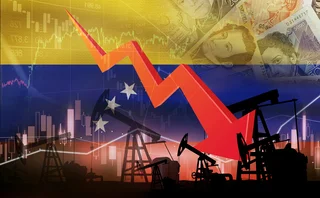
Why the US election fallout was not a surprise to banks

There is anecdote in Michael Lewis’s bestseller, The Big Short, that makes the case for stress-testing as a backstop to risk modelling more effectively than any regulatory dictum could.
Lewis is describing Morgan Stanley’s massive bets on subprime mortgage bonds in the run-up to the US housing market collapse of 2007, which – after lucrative early successes – were being run from a specially formed unit led by bond trader Howie Hubler.
Hubler’s positions in collateralised debt obligations were stress-tested for losses on subprime pools reaching 6% – the highest in recent history – and still showed a healthy profit. Morgan Stanley’s then-chief risk officer, Tom Daula, asked what would happen if losses hit 10%. Lewis documents the reaction of Hubler and his traders: “It was more than a little weird,” said one of them. “There was a lot of angst about it. It was sort of viewed as: ‘These folks don’t know what they’re talking about. If losses go to 10%, there will be, like, a million homeless people.’” (Losses in the pools Hubler’s group had bet on would eventually reach 40%.)
As a senior Morgan Stanley executive outside Hubler’s group put it: “They didn’t want to show you the results. They kept saying: ‘That state of the world can’t happen.’”
Fast-forward to today, and traders seem more willing to ask ‘What if?’
As Lewis’s bemused executive had it, plenty of people had thought the current state of the world – a contested US presidential election in the middle of a pandemic that has killed millions and wrecked the global economy – couldn’t happen, either. Traders could have been forgiven for dismissing the scenario of an election result – which the incumbent has blamed on millions of fraudulent votes – looking set to remain unclear for days, if not weeks.
But, clearly, many did hypothesise such a situation – which might go some way to explaining why market reaction in the immediate aftermath has been muted to the point of being “eerily quiet”, as one trader has described it.
“This scenario was not out of the realm of possibilities. People were considering it, and would have priced in something that looked like this,” says a senior risk manager at a US bank.
“They might’ve assigned a lower probability to it, but it’s not taking them by complete surprise.”
At its crudest, stress-testing forces firms to look at their risk drivers, scratch their heads, and talk to their traders and portfolio managers about whether they’d still be comfortable with their exposures if a given situation came to pass.
As the risk manager sees it: “After 2016, people learned not to take the most obvious outcome as a given, and to plan for chaos. Every firm should have planned and strategised around these outcomes. Banks will have a playbook they can follow for what is likely beyond this point.”
Of course, like any risk measure, stress tests can be gamed – and, as in the unfortunate case of Morgan Stanley’s credit teams, their outputs ignored. But, even if a given outcome is unexpected, banks shouldn’t be unprepared.
Only users who have a paid subscription or are part of a corporate subscription are able to print or copy content.
To access these options, along with all other subscription benefits, please contact info@risk.net or view our subscription options here: http://subscriptions.risk.net/subscribe
You are currently unable to print this content. Please contact info@risk.net to find out more.
You are currently unable to copy this content. Please contact info@risk.net to find out more.
Copyright Infopro Digital Limited. All rights reserved.
As outlined in our terms and conditions, https://www.infopro-digital.com/terms-and-conditions/subscriptions/ (point 2.4), printing is limited to a single copy.
If you would like to purchase additional rights please email info@risk.net
Copyright Infopro Digital Limited. All rights reserved.
You may share this content using our article tools. As outlined in our terms and conditions, https://www.infopro-digital.com/terms-and-conditions/subscriptions/ (clause 2.4), an Authorised User may only make one copy of the materials for their own personal use. You must also comply with the restrictions in clause 2.5.
If you would like to purchase additional rights please email info@risk.net
More on Risk management
Rethinking model validation for GenAI governance
A US model risk leader outlines how banks can recalibrate existing supervisory standards
FCMs warn of regulatory gaps in crypto clearing
CFTC request for comment uncovers concerns over customer protection and unchecked advertising
UK clearing houses face tougher capital regime than EU peers
Ice resists BoE plan to move second skin in the game higher up capital stack, but members approve
The changing shape of variation margin collateral
Financial firms are open to using a wider variety of collateral when posting VM on uncleared derivatives, but concerns are slowing efforts to use more non-cash alternatives
Repo clearing: expanding access, boosting resilience
Michel Semaan, head of RepoClear at LSEG, discusses evolving requirements in repo clearing
The state of IMA: great expectations meet reality
Latest trading book rules overhaul internal models approach, but most banks are opting out. Two risk experts explore why
How geopolitical risk turned into a systemic stress test
Conflict over resources is reshaping markets in a way that goes beyond occasional risk premia
Many banks see obstacles to options-based IRRBB hedging
Liquidity, accounting treatment and culture seen as impediments to wider use of swaptions, caps and floors








